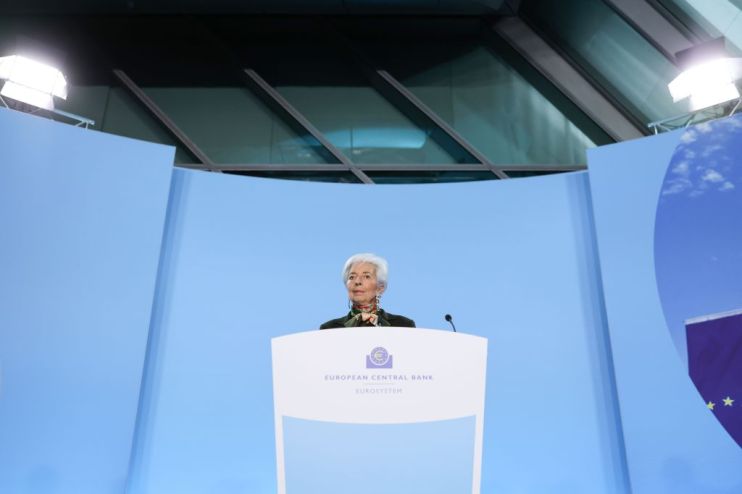European Central Bank hoists interest rates to joint record high of 3.75 per cent

The European Central Bank (ECB) today lifted interest rates for the ninth time in a row, following the US Federal Reserve’s rise last night.
It means the eurozone’s key interest rate now stands at 3.75 per cent, its highest level in 22 years.
President Christine Lagarde and the rest of the governing council opted for a 25 basis point increase, the same degree of tightening selected by Fed Chair Jerome Powell and the federal open market committee last night.
ECB deposit rate is now back to its joint steepest level since the monetary authority was created at the turn of the millennium.
Many analysts think this could be the central bank of the 20 countries using the euro’s final rate rise, which would bring an end to a more than year long campaign to drag down inflation.
Lagarde said the ECB is now in “data dependent” mode, meaning future rate decisions will be taken based on whether numbers inbetween meetings show inflation easing or firming.
Before the ECB’s first rate rise, borrowing costs had been negative for several years as policymakers tried to stimulate demand and support the economy after the 2008 financial crisis.
However, a resurgence in prices compelled the ECB to fling policy into restrictive territory, raising rates from minus 0.5 per cent in June 2022 to 3.75 per cent this month.
Cost of living pressures are cooling across the continent. The average rate of inflation in the eurozone has fallen from a peak of around 11 per cent to 5.5 per cent. In France, Italy and Spain, inflation is running at 5.3 per cent, 6.7 per cent and 1.6 per cent respectively.
However, in Germany, Europe’s biggest economy, it is very high at 6.8 per cent.
Core inflation, much like in the US and UK, is still elevated at 5.5 per cent.
There is a chance Lagarde and co will keep dosing the economy with further rate rises if inflation stays high and consumer spending spurts upwards. They hinted another increase is possible at the next meeting if the incoming data tops expectations.
“Inflation continues to decline but is still expected to remain too high for too long,” the ECB said in its policy statement today.
Rates will stay high for “as long as necessary” to pull inflation back to target, Lagarde said.
“The mention of inflation coming down but staying above target “for an extended period” does not sound as if the ECB is yet willing to stop hiking rates,” Carsten Brzeski, global head of macro at ING, said.
There are clear signs the ECB’s prior rate rises are drilling a nail through the economy. Purchasing manager indexes this week confirmed the bloc is very close to a recession, while separate lending data revealed demand for credit has fallen off a cliff.
Concerns about punishing the eurozone economy too much to deal with inflation may convince the ECB to ease off the brake at future meetings for fear of engineering a needless recession.
Last night, the Fed lifted borrowing costs 25 basis points to a range of 5.25 per cent and 5.5 per cent, also a 22 year high. Powell too said the Fed is now data dependent.
Bank of England officials are next Thursday tipped to do the same, which would be the 14th straight rate rise, leaving Bank Rate at 5.25 per cent. Markets think UK rates will peak around 5.75 per cent and six per cent.